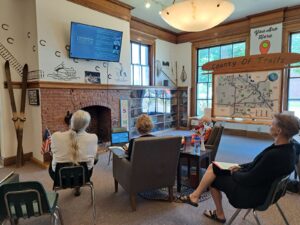Economic Development Corporation Spreads the Word on Lucrative Tax Credit Programs
In the world of historical preservation and confusing grant requirements, knowledge is key.
That was the focus of a recent meeting hosted by the Langlade County Economic Development Corporation (EDC), which brought together area historical societies and financial representatives to review the myriad of possibilities to preserve and enhance historic structures for public use and private businesses.
“It’s very important that we bring this information forward,” Angie Close, EDC director, said. “Especially in rural areas, it is important to aid in rehabilitating our historic buildings using the resources available. It is another key to our economic development.”
Through Internet Zoom meeting resources available at the Visitor’s Center located at the Langlade County Historical Society Museum, guests participated in a presentation led by Jen Davel, Midwest regional director for Heritage Consulting Group in Milwaukee. Attendees from the Langlade County, Elcho, and White Lake historical societies along with CoVantage Credit Union and the Economic Development Corporation reviewed the complexities of the state and federal historic tax credit programs.

Davel explained that qualifying programs can receive up to 40 percent of allowable expenses reimbursed through the form of tax credits.
The federal program, which provides 20 percent credits, applies to “substantial” renovations carried out in income-producing buildings, making them mainly desirable to private businesses. The state credits, also at 20 percent, have more modest requirements—a minimum of $50,000 in project costs–and allow eligible nonprofits such as museums and libraries to receive the credits and resell them to private businesses and banks.
“Originally I didn’t see this as something we would pursue, since we are a nonprofit and don’t pay taxes, so we have no use for tax credits,” Greg Mejak of the Elcho Historical Society, in the midst of a massive renovation project, said. “But knowing we can take those credits and sell them makes it far more attractive…Getting the word out about this is great.”
Both the state and federal tax credit programs require that buildings must be listed on the National Register of Historic Places to be eligible. The Langlade County Historical Society Museum, located in the 1914 Carnegie Library, is already listed and Elcho is in the process of listing the Grange Hall which is being turned into a museum. Several other county buildings are also listed and others are certainly eligible.
Both programs also require that improvements meet requirements enumerated by the Secretary of Interior Standards for Rehabilitation.
Davel stressed that the process of obtaining a historic listing and having a project approved for the credits is exhaustive and must be completed before any work can begin. But in many cases the substantial tax credits—and the ability to sell them—make it worth the effort.
The entire presentation, including the PowerPoint, is available for viewing through the Langlade County Economic Development Corporation office.
“There are a lot more business owners that we want to share this with,” Close said.
